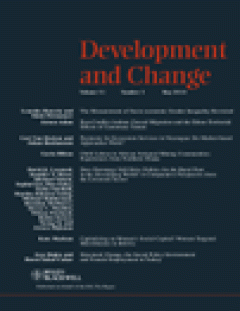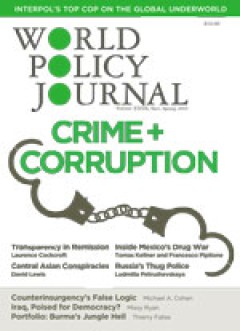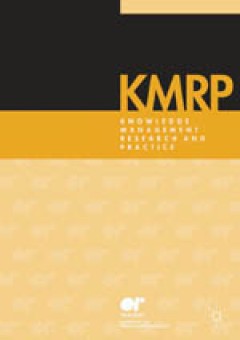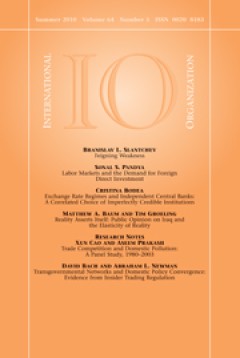Filter by

Humanitarian Space as Arena: A Perspective on the Everyday Politics of Aid
‘Humanitarian space’ denotes the physical or symbolic space which humanitarian agents need to deliver their services according to the principles they uphold. This concept, which separates humanitarian action from its politicized environment, is widely used in policy documents and academic texts, even though empirical evidence abounds that this space is in fact highly politicized. To some extent…
- Edition
- Volume 41, Issue 6, November 2010, pages 1117–1139
- ISBN/ISSN
- 0012155x
- Collation
- -
- Series Title
- Development and Change
- Call Number
- -

The Big Question: How Can Nations Break the Cycle of Crime and Corruption?
If not quite as apocalyptic as pope would have us believe, corruption and crime all to often drag nations into a cycle of deprivation and wanton greed-companies bribing bureaucrats in exchange for lucrative contracts, petty graft greasing the palms of low-level civil servants, and powerful politicians enriching themselves at the expense of their people and the advancement of society. How do nat…
- Edition
- Vol. XXVII, No. 1, Spring 2010.pp. 3-16
- ISBN/ISSN
- 07402775
- Collation
- -
- Series Title
- World Policy Journal
- Call Number
- -

Social semantic cloud of tags: semantic model for folksonomies
A growing number of tagging applications have begun to provide users the ability to socialise their own keywords. Tagging, which assigns a set of keywords to resources, has become a powerful way for organising, browsing, and publicly sharing personal collections of resources on the Web. It is called folksonomies. These systems on current social websites, however, have deficiencies in defining t…
- Edition
- Vol. 8, No. 3, September 2010.pp. 193–202
- ISBN/ISSN
- 14778238
- Collation
- -
- Series Title
- Knowledge Management Research & Practice
- Call Number
- -

Integrating educational institutions to produce intellectual capital for sust…
This research is part of a broader investigation to analyse the processes followed by the Caguas Municipality at the Commonwealth of Puerto Rico in an effort to develop the characteristics of a ‘Smart City’ as an example of sustainable development. We describe the integration of the educational institutions’ initiatives and the municipal government strategic plan to contribute to the knowledge …
- Edition
- Vol. 8, No. 3, September 2010.pp. 203–215
- ISBN/ISSN
- 14778238
- Collation
- -
- Series Title
- Knowledge Management Research & Practice
- Call Number
- -

A hybrid fuzzy real option analysis and group ordinal approach for knowledge …
The intensity of global competition and ever-increasing economic uncertainties has led organizations to search for more efficient and effective ways to improve organizational productivity by investing in knowledge management (KM) initiatives. In this research, we propose a framework to assess KM investment opportunities. Precise and crisp information is fundamentally indispensable in strategic …
- Edition
- Vol. 8, No. 3, September 2010. pp. 216–228
- ISBN/ISSN
- 14778238
- Collation
- -
- Series Title
- Knowledge Management Research & Practice
- Call Number
- -

Knowledge governance within clusters: the case of small firms
Despite the vast literature on knowledge management, little research has addressed the specificities of knowledge integration at the cluster level. Moreover, the literature on clusters has not focused on the role that governance may play in knowledge management. Anchored in a knowledge-based perspective, this paper aims at bridging the two fields, filling the gap by analysing the role of cluste…
- Edition
- Vol. 8, No. 3, September 2010. pp. 229–239
- ISBN/ISSN
- 14778238
- Collation
- -
- Series Title
- Knowledge Management Research & Practice
- Call Number
- -

Building script-based tacit knowledge in call centre trainees
An exploratory case study on a technical support call centre in China is presented, which investigates a new paradigm that script-based tacit knowledge for action is built in the brains of learners, rather than transferred. Twelve techniques used by the case study organization to build tacit knowledge scripts in the minds of the trainees are discussed. It was found that one type of script-based…
- Edition
- Vol. 8, No. 3, September 2010. pp. 240–255
- ISBN/ISSN
- 14778238
- Collation
- -
- Series Title
- Knowledge Management Research & Practice
- Call Number
- -

A conceptual model for managing incompatible impacts of organisational struct…
Awareness levels of individuals about various aspects of the collaborative processes can be achieved by effective promotive interactions among them. Cultural structures are regarded as one of the major determinants of knowledge sharing patterns and awareness levels of individuals in collaborative contexts. Through an exploratory review of the literature, the present study points to the two riva…
- Edition
- Vol. 8, No. 3, September 2010. pp. 256–264
- ISBN/ISSN
- 14778238
- Collation
- -
- Series Title
- Knowledge Management Research & Practice
- Call Number
- -

Towards a typology of knowledge-intensive organizations: determinant factors
Phrases such as ‘knowledge-intensive organizations’ (KIOs) and ‘knowledge-intensive firms’ (KIFs), have recently found common usage, describing the distinct activities and attributes of some organizations. But a review of the literature reveals a lack of consensus among scholars and practitioners on the definition of KIOs. What is also absent from the discussion is an agreement on the factors t…
- Edition
- Vol. 8, No. 3, September 2010. pp. 265–277
- ISBN/ISSN
- 14778238
- Collation
- -
- Series Title
- Knowledge Management Research & Practice
- Call Number
- -

The moderating effect of knowledge sharing on the relationship between manufa…
This paper investigates the critical role of knowledge sharing (KS) in leveraging manufacturing activities, namely integrated supplier management (ISM) and new product development (NPD) to improve business performance (BP) within the context of Taiwanese electronic manufacturing companies. The research adopted a sequential mixed method research design, which provided both quantitative empirical…
- Edition
- Vol. 8, No. 4, December 2010. pp. 285–306
- ISBN/ISSN
- 14778238
- Collation
- -
- Series Title
- Knowledge Management Research & Practice
- Call Number
- -

Knowledge transfer in post-merger integration management: case study of a mul…
Faced with demanding time constraints and the need to compete and communicate across a global market, firms have engaged in mergers and acquisitions (M&As) to accomplish various objectives, including, but not limited to, increasing growth potential and expanding product lines. Given the vital role of knowledge in the M&A context, the aim of this case study is to explore the literature in the ar…
- Edition
- Vol. 8, No. 4, December 2010. pp. 307–321
- ISBN/ISSN
- 14778238
- Collation
- -
- Series Title
- Knowledge Management Research & Practice
- Call Number
- -

Knowledge markets in firms: knowledge sharing with trust and signalling
Knowledge sharing and learning are critically important to the success of knowledge management. In this research, we study the design of incentive rewards to facilitate knowledge transfer utilizing an internal knowledge market within organizations. The internal knowledge market is modelled as a marketplace where knowledge providers can send signals about their knowledge and learners may volunta…
- Edition
- Vol. 8 No. 4, December 2010. pp. 8, 322–339
- ISBN/ISSN
- 14778238
- Collation
- -
- Series Title
- Knowledge Management Research & Practice
- Call Number
- -

The intangibles’ mindset of CFOs’ and corporate performance
This paper aims to analyze the companies’ view about the financial valuation of intangibles relevance and its influence on corporate performance. Based on the theory of resources, the role of intangibles in business competitiveness is justified. The traditional factors of production have become secondary, while the success is primarily based on the development and utilization of intangible reso…
- Edition
- Vol. 8, No. 4, December 2010. pp. 340–350
- ISBN/ISSN
- 14778238
- Collation
- -
- Series Title
- Knowledge Management Research & Practice
- Call Number
- -

Knowledge for sale – the benefits and effects of off-shoring knowledge-base…
A framework consisting of a conceptual model and a closed-loop knowledge work outsourcing decision model is developed. A process flow model of a medical device company's product development function is analysed, where this framework is applied to understand various outsourcing options for the company. The conceptual framework describes major attributes related to outsourcing decisions, paramete…
- Edition
- Vol. 8, No. 4, December 2010. pp. 351–368
- ISBN/ISSN
- 14778238
- Collation
- -
- Series Title
- Knowledge Management Research & Practice
- Call Number
- -

Learning capability: the effect of existing knowledge on learning
It has been observed that different people learn the same things in different ways – increasing their knowledge of the subject/domain uniquely. One plausible reason for this disparity in learning is the difference in the existing personal knowledge held in the particular area in which the knowledge increase happens. To understand this further, in this paper knowledge is modelled as a ‘system of…
- Edition
- Vol. 8 No. 4, December 2010. pp. 369–379
- ISBN/ISSN
- 14778238
- Collation
- -
- Series Title
- Knowledge Management Research & Practice
- Call Number
- -

The Conscription of Wealth: Mass Warfare and the Demand for Progressive Taxation
The dominant narrative of the politics of redistribution in political science and economics highlights the signature role of the rise of electoral democracy and the development of political parties that mobilize working-class groups. We argue in this article that this narrative ignores the critical role played by mass warfare in the development of redistributive public policies. Focusing attent…
- Edition
- Vol. 64, No. 4, Fall 2010.pp. 529-561
- ISBN/ISSN
- 00208183
- Collation
- -
- Series Title
- International Organization
- Call Number
- -

Nature or Nurture? Judicial Lawmaking in the European Court of Justice and th…
Are international courts power-seeking by nature, expanding the reach and scope of international rules and the courts' authority where permissive conditions allow? Or, does expansionist lawmaking require special nurturing? We investigate the relative influences of nature versus nurture by comparing expansionist lawmaking in the European Court of Justice (ECJ) and the Andean Tribunal of Justice …
- Edition
- Vol. 64, No. 4, Fall 2010.pp. 563-592
- ISBN/ISSN
- 00208183
- Collation
- -
- Series Title
- International Organization
- Call Number
- -

Who Is Punished? Regional Intergovernmental Organizations and the Enforcement…
Scholars have found an association between membership in regional intergovernmental organizations (IGOs) and democracy, and IGO enforcement is often credited as an important factor explaining this link. But empirical evidence reveals great variation in whether these organizations actually respond to violations of democratic norms, even in democratic regions. Why do IGOs punish some norm-violati…
- Edition
- Vol. 64, No. 4, Fall 2010. pp. 593-625
- ISBN/ISSN
- 00208183
- Collation
- -
- Series Title
- International Organization
- Call Number
- -

Oil and Revolutionary Governments: Fuel for International Conflict
Oil-exporting states, or petrostates, engage in militarized interstate disputes (MIDs) at a much higher rate on average than nonpetrostates. Why is this so? Further, what explains the variation among the petrostates in adopting aggressive foreign policies and engaging in MIDs on that basis? This article develops a theory that proposes that revolutionary petrostates have a higher propensity to l…
- Edition
- Vol. 64 No. 4, Fall 2010. pp. 661-694
- ISBN/ISSN
- 00208183
- Collation
- -
- Series Title
- International Organization
- Call Number
- -

The Effectiveness of Monetary Policy Anchors: Firm-Level Evidence
Analyses of monetary policy posit that exchange-rate pegs, inflation targets, and central bank independence can help anchor private-sector inflation expectations. Yet there are few direct tests of this argument. We offer cross-national, micro-level evidence on the effectiveness of monetary anchors in controlling private-sector inflation concerns. Using firm-level data from eighty-one countries …
- Edition
- Vol. 64, No. 4, Fall 2010 .pp. 695-717
- ISBN/ISSN
- 00208183
- Collation
- -
- Series Title
- International Organization
- Call Number
- -
 Computer Science, Information & General Works
Computer Science, Information & General Works  Philosophy & Psychology
Philosophy & Psychology  Religion
Religion  Social Sciences
Social Sciences  Language
Language  Pure Science
Pure Science  Applied Sciences
Applied Sciences  Art & Recreation
Art & Recreation  Literature
Literature  History & Geography
History & Geography